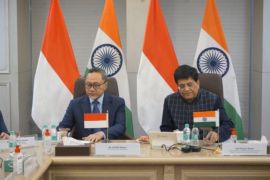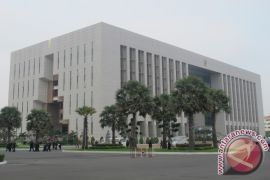As the influx of cheaper Chinese goods has begun to hurt domestic producers, many are at odds over whether free trade accord with China is necessary.
While asking the government to review the accord, Deputy Chairman of the House Commission VI Nurdin Tampubolon said local producers are under a threat of bankruptcy due to an unusual surge in the flow of Chinese products into the country.
"If the accord is continued, the national industry will collapse. It is a matter of time for them to go bankrupt," Nurdin of the People`s Conscience Party (Hanura) said.
To prevent the accord from putting a further strain on domestic producers, the government must try hard to renegotiate it or face the national industry to collapse, he said.
What is most likely to deal with the matter other than renegotiating the accord is improving the competitive edge of national products. But this is not an easy job because the government has to improve various regulations, scrap illegal levies, cut lending rates, and control imported goods, among others, he said.
Right now the implementation of ACFTA has begun to hurt the national industry and affect products in regions, he said. "I have just arrived from a working visit in Maluku where I found imported goods, including fish were sold there. As a matter of fact, we are a maritime state."
Indonesian is suffering losses in its ACFTA-based fishery trade because the broad free trade accord was concluded without first making careful calculations, coordinator of the People`s Coalition for Fisheries Justice (Kiara) Abdul Halim said.
"The free trade with China has not been carefully calculated beforehand. In the context of fishery, this agreement has very much disadvantaged fishermen and fishery businessmen in Indonesia due to the influx of imported fish," he said.
Deputy Secretary General of the United Development Party (PPP) Romahurmuziy joined the chorus in calling for the government to review the accord in response to a trade deficit with China over the past couple of years.
As part of efforts to protect the domestic industry, PPP asked the government to review the policy of importing goods which could be met by domestic producers without disrupting supply and demand, he said at a press conference following the party`s national working congress this month.
"In line with trade deficit (with China), PPP also asked the government to renegotiate the ASEAN-China Free Trade Agreement, in the capacity of Indonesia as the chair of ASEAN which will host ASEAN Summit this year," he said.
But researcher Dedy Permadi of the Center for World Trade Studies at the Yogyakarta-based Gadjah Mada University (UGM) said ACFTA is a chance for Indonesia to expand the overseas market for its products.
"With ACFTA, Indonesia will have wider access to the overseas market. Indonesia will have market share almost six times higher than the domestic market as the Chinese population now hits a level of more than 1.3 billion,? he said at a discussion "ACFTA: Chance or Challenge" this month.
The huge Chinese population will no doubt create a chance for Indonesian producers to supply goods to China. Indonesia has a wide range of typical products that other countries do not have much, including palm oil, cocoa, tea, cattle, chicken, and tropical fruits, he said.
ACFTA also allows Indonesia to attract as much investment as possible from China whose gross domestic product (GDP) currently ranks second in the world. China also has foreign exchange reserves of US$2.4 trillion, the highest in the world. "The larger the GDP and foreign exchange reserves the higher the investment the country will make."
Chinese Ambassador to Indonesia Zhang Qiyue said ACFTA has shown a good trend because since 2005 there has been an annual trade increase of more than 20 percent. In 2010 alone, the increase reached 50 percent.
China wants trade with ASEAN member states under CAFTA to favor both sides, she said. "We want mutually beneficial trade. If it only favors us it will not continue. Indonesia is China`s strategic partner in terms of preserving both sides` long-term benefit."
Under the trade agreement signed in 2004 and fully implemented on January 1 last year, more than 7000 products traded between China and six ASEAN member states - Brunei Darussalam, Malaysia, Indonesia, the Philippines, Singapore, and Thailand are exempted from import duties.
But the results of a study made by the Industry Ministry show Indonesian products have been losing ground in the domestic market to Chinese products since the accord was put into force early last year.
Trade Ministry data show Indonesia`s exports to China rose to US$15.7 billion in 2010 from US$11.5 billion in 2009. Imports from China in 2010 were US$20.4 billion, a 31 percent increase compared with US$14 billion the year before.
Both countries differed about the 2010 trade deficit, with Indonesia recording it at US$5-7 billion and China putting it at US$2.8 billion.
Coordinating Minister for Economic Affairs Hatta Rajasa said last March he does not rule out the possibility that ACFTA will be evaluated if unfair trade practices such as dumping are found.
"Such evaluation is a must. Under the free trade agreement with China, the evaluation is also made possible," he said responding to the results of a survey by the Industry Ministry which found indicators of dumping practices involving a number of Chinese products.
According to the survey, at least 190 types of Chinese products whose selling prices are subject to evaluation. Of the total, 38 types are sold at lower prices in Indonesia than in China. (*)
Reporter: By Suharto
Editor: Kunto Wibisono
Copyright © ANTARA 2011









